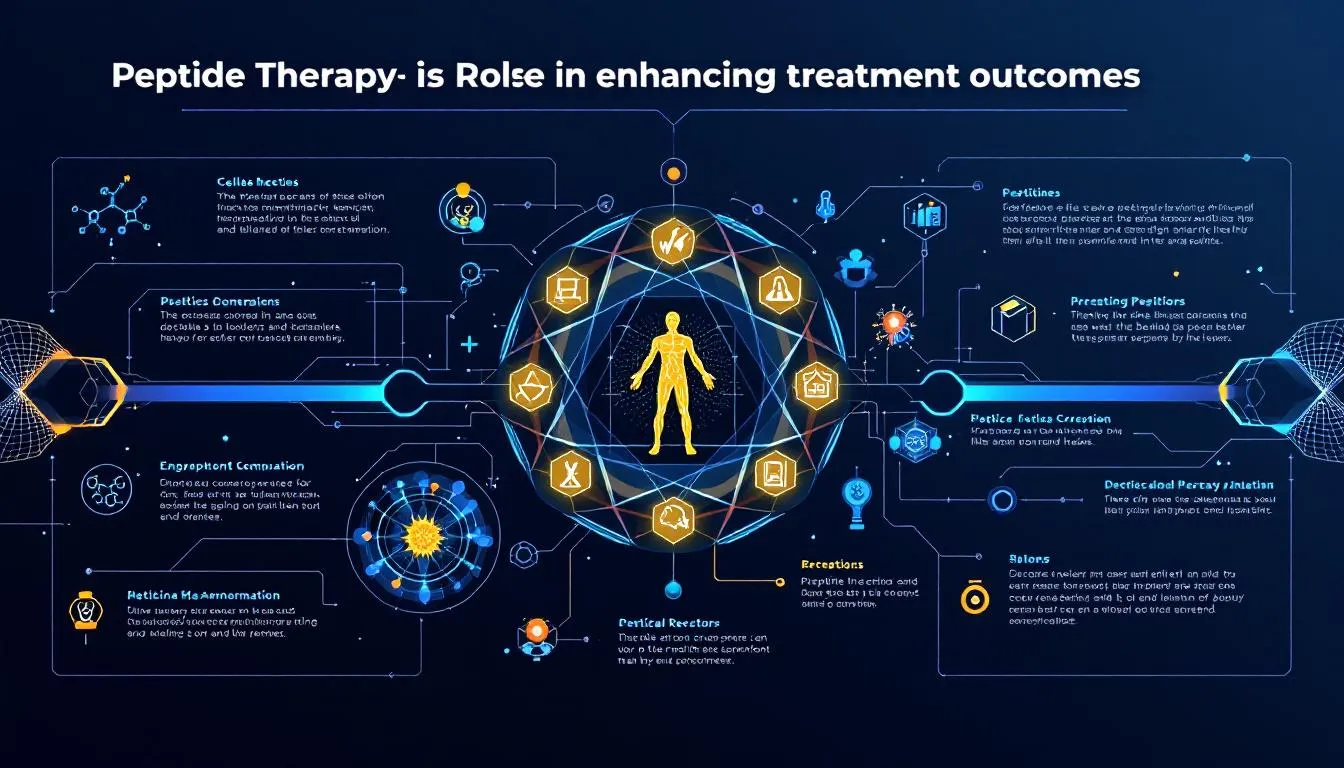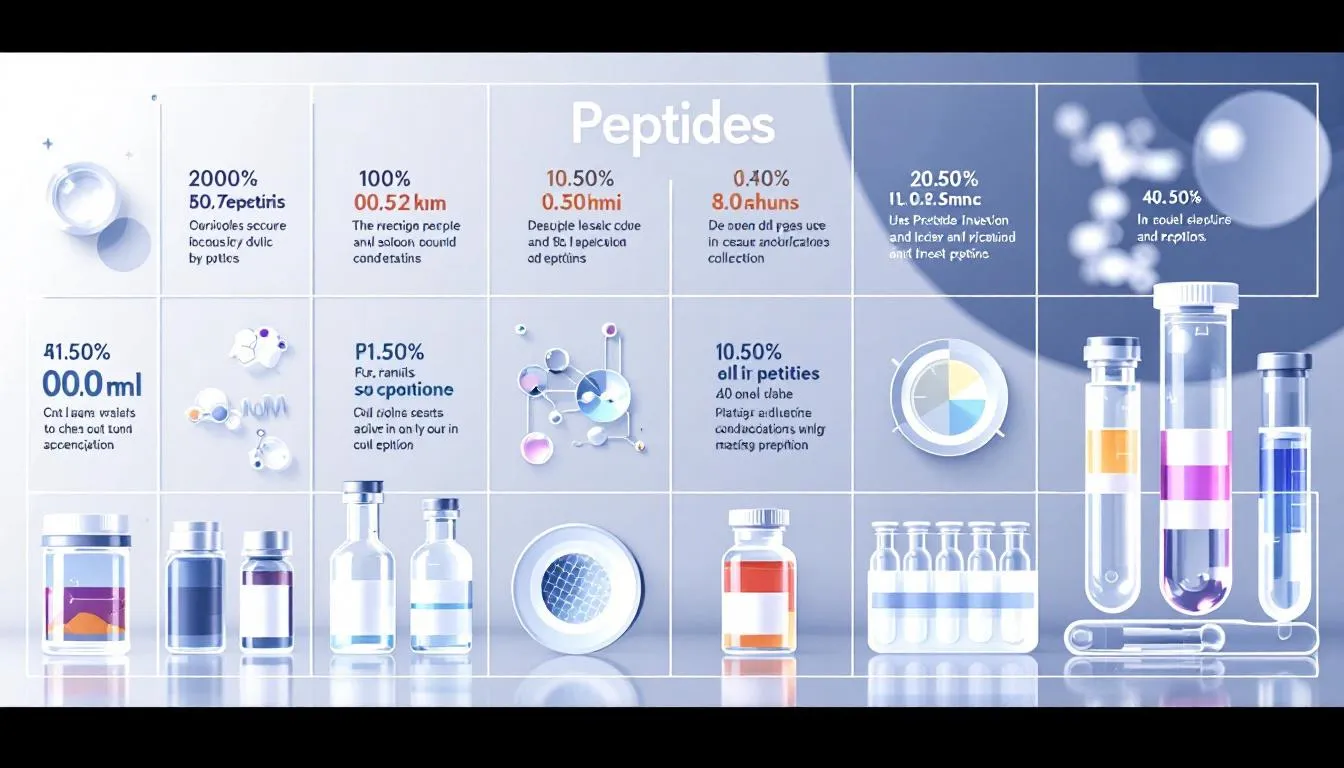
Top Peptide Experts Offering Treatment Solutions for Optimal Health
Milacy TraviesoPeptide experts are healthcare professionals who specialize in developing and administering peptide-based treatments. Using advanced scientific research, they create personalized therapies to tackle various health issues. In this article, discover who peptide experts are, why their expertise is essential, and how they can optimize your health with tailored peptide therapies.
Key Takeaways
- Peptide experts specialize in personalized peptide therapy, tailoring treatments based on individual health goals and profiles to enhance therapeutic outcomes.
- Recent advancements in peptide science have led to the approval of over 80 peptide drugs, showcasing the versatility of peptide therapy in managing various health conditions.
- Selecting a reputable peptide expert is crucial for ensuring safety and efficacy, emphasizing the importance of expertise, product purity, and personalized care in peptide treatment.
Who Are Peptide Experts?
Peptide experts specialize in the application and management of peptide therapy. Peptides, short chains of amino acids, play crucial roles as signaling molecules in the body. These professionals often have advanced training in fields such as functional or regenerative medicine, leveraging the latest research to benefit their patients.
A peptide specialist’s role extends beyond mere administration. They are responsible for tailoring peptide therapy to meet individual health goals, ensuring that patients receive the most effective and safe treatments. From chronic conditions to enhancing overall well-being, peptide experts remain at the forefront of medical innovation, offering solutions backed by rigorous scientific research.
Importance of Expertise in Peptide Therapy
Understanding the hormonal effects of peptides optimizes their therapeutic benefits. Expertise in peptide therapy ensures accurate dosing, crucial for patient safety and efficacy. Professionals use advanced techniques like High-Performance Liquid Chromatography (HPLC) to confirm the purity and potency of peptides, avoiding complications and maximizing therapeutic potential.
Reputable peptide experts comply with local and international regulations to ensure product safety and purity. They disclose details about raw materials and synthesis methods, reassuring patients of receiving high-quality, safe treatments tailored to their health needs.
How Peptide Experts Enhance Treatment Outcomes

Peptide experts enhance treatment outcomes by tailoring protocols to individual patient characteristics. Using patient-specific data, including genetic and health profiles, enables experts to customize peptide therapy. This personalized approach addresses health challenges like metabolic disorders and aging, improving overall outcomes.
Integrating peptide therapy with existing treatments allows experts to create comprehensive care plans that address multiple facets of a patient’s health. This holistic approach optimizes treatment effectiveness and minimizes adverse effects, ensuring a smoother health journey.
Personalized Peptide Protocols
Personalized peptide protocols are central to effective peptide therapy. These protocols involve:
- Tailoring based on individual health goals and lab results to ensure suitable treatment
- Consultations with peptide experts that include comprehensive health assessments
- Determining the most effective and safe treatment options for each patient
Peptide therapy supports various aspects of health, including:
- Metabolic health
- Hormonal optimization
- Immune function
- Cognitive clarity
- Athletic performance
Targeting these specific concerns, personalized peptide protocols can significantly enhance overall well-being and quality of life at any weight and age, highlighting the potential benefits.
Combining Peptides with Other Treatments
Combining peptides with other treatments provides a synergistic effect, enhancing healing and recovery. Peptides like Thymosin Beta 4 enhance recovery, particularly after injuries or surgeries, and treat various inflammatory conditions, showcasing their versatility.
Consultations with peptide experts emphasize long-term health solutions over quick fixes. They cover the integration of peptide therapy with existing treatments, as well as lifestyle and nutritional adjustments, ensuring comprehensive care. This holistic approach addresses immediate health concerns and promotes long-term well-being.
Commonly Used Peptides by Experts

Peptide therapy now addresses a wide range of conditions, from chronic fatigue syndrome to Hashimoto’s thyroiditis. Experts utilize various peptides to manage complex health issues, leveraging advancements in peptide production and modification technologies. These innovations have enhanced the therapeutic applications of peptides across multiple medical fields.
Recent developments in peptide science have led to the approval of over 80 peptide drugs worldwide, highlighting their versatility and effectiveness. These advancements underscore the role of peptide therapy in modern medicine, offering hope for patients with diverse health conditions.
Growth Hormone Secretagogues (GHSs)
Growth Hormone Secretagogues (GHSs) promote growth hormone secretion, essential for overall metabolic functions. By stimulating growth hormone release, GHSs enhance energy levels and body composition. These peptides act as agonists, mimic naturally occurring hormones to promote growth and metabolic health.
GHSs benefit individuals looking to improve metabolism and energy levels. By promoting growth hormone secretion, these peptides help achieve health and wellness goals more effectively.
Thymosin Beta 4
Thymosin Beta 4, the predominant thymosin form in the body, plays a significant role in healing and anti-inflammatory processes. Found in high concentrations in wound tissue, it is involved in immune regulation and reducing inflammation. This peptide can be taken alone or with existing therapies, providing a versatile solution for various health conditions.
Thymosin Beta 4 supports wound healing and reduces inflammation without significant side effects, making it a safe and effective option for improving overall health and well-being.
BPC-157
BPC-157, a peptide found in gastric fluid, is known for its stability and use as an oral supplement. Dr. Aziz frequently uses BPC-157 post-surgery to enhance recovery and speed healing. This peptide is particularly valued for alleviating joint pain and accelerating recovery from injuries.
BPC-157’s ability to enhance recovery and alleviate joint pain makes it valuable in regenerative medicine and regenerative therapy. Whether for post-surgery recovery or joint pain relief, this peptide offers significant benefits for reclaim health and well-being.
Peptide Research and Development

Peptide research and development is rapidly evolving, with more than 170 peptide candidates currently in active clinical trials. Growing interest and investment in peptide therapeutics are driven by advancements in peptide modifications, enhancing their stability and bioactivity. These innovations pave the way for new therapeutic applications, offering hope for better health outcomes.
However, developing peptide-based drugs faces challenges like limited membrane permeability and stability. Addressing these issues requires new design strategies and delivery methods, critical for the successful clinical application of peptide therapies.
Advances in Peptide Science
Recent advancements in peptide science have led to innovative treatments and enhanced patient care. For example, Epithalon, a longevity peptide and telomerase activator, was developed in Russia to help prevent heart disease and cancer. Such advancements highlight the potential of peptide therapy to address various health concerns, improve overall well-being, and support the regeneration of cells.
Ongoing research and developments in peptide therapy signal a promising future for its applications in optimizing health and well-being. Experts continually explore new peptides and therapeutic strategies to align with patient wellness objectives.
Challenges in Peptide Research
Despite promising advancements, peptide research has been studied and faces several challenges. The complex nature of peptide interactions with biological systems necessitates strict adherence to research protocols to minimize errors. Improper handling can degrade high-quality peptides, emphasizing the importance of following protocols.
Issues like proteolytic instability and difficulties in large-scale synthesis can hinder the clinical application of peptides. Addressing these challenges is crucial for the continued success and development of peptide-based therapies.
Finding the Right Peptide Expert

Finding the right peptide expert ensures the safety and effectiveness of peptide therapy. A positive reputation and customer reviews indicate a peptide expert’s reliability and service quality. Additionally, consider the experience of the peptide expert; those with longer industry presence are generally more reliable.
Reputable peptide providers emphasize purity, sterility, and third-party testing to ensure high-quality products. Choosing an expert with these qualities ensures the safety and efficacy of your peptide therapy.
Book a Consultation with a Peptide Expert
Booking a consultation with a peptide expert is a key step in exploring personalized peptide therapy options. The process includes a detailed health assessment to create an effective and personalized treatment plan. Many peptide therapy clinics offer initial consultations virtually, making access easier for patients.
Booking a consultation allows you to discuss a variety of tailored options for optimal healthcare and well-being. This personalized approach ensures you feel the most suitable and effective treatments for your specific health needs in functional medicine, as shown in various forms of studies, minimizing the risk of loss. This practice helps in achieving better health outcomes.
Summary
Peptide therapy represents a groundbreaking approach to enhancing health and well-being. With the right expertise, these powerful molecules can be tailored to address a wide range of health concerns, from chronic conditions to overall wellness. The importance of finding a reputable and experienced peptide expert cannot be overstated, as their knowledge and skills are crucial for maximizing the benefits of peptide therapy.
As you explore the potential of peptide therapy, understanding the specific roles of different peptides is key GHK-Cu vs BPC-157 . For instance, GHK-Cu is primarily researched for its remarkable skin rejuvenation and collagen-building properties, making it a focus for anti-aging and tissue repair. In contrast, BPC-157 is widely recognized for its potent systemic healing benefits, particularly in accelerating the recovery of muscles, tendons, and ligaments.
Frequently Asked Questions
What are peptides and how do they work in the body?
Peptides are short chains of amino acids that serve as signaling molecules, influencing processes like metabolism and immune function by binding to specific receptors in the body. Their diverse roles are essential for maintaining overall health.
Why is expertise important in peptide therapy?
Expertise in peptide therapy is crucial for ensuring accurate dosing, safety, and effectiveness. Professionals apply advanced techniques to verify peptide quality and adhere to regulatory standards, ultimately maximizing patient outcomes.
How do peptide experts personalize treatment protocols?
Peptide experts personalize treatment protocols by analyzing patient-specific data, such as genetic and health profiles, to create tailored therapy plans. This individualized strategy significantly improves treatment outcomes by directly addressing the unique health needs of each patient.
What are some commonly used peptides in therapy?
Commonly used peptides in therapy include Growth Hormone Secretagogues (GHSs), Thymosin Beta 4, and BPC-157, each serving distinct roles in promoting growth hormone secretion and aiding in healing and recovery. Their therapeutic applications highlight their importance in various medical treatments.
How can I find a reliable peptide expert?
To find a reliable peptide expert, seek professionals with strong reputations, positive customer reviews, and significant industry experience, ensuring they prioritize product purity, sterility, and third-party testing. This approach will help you connect with trustworthy experts in the field.
Author Name

Newsletter
Recent Post
















































